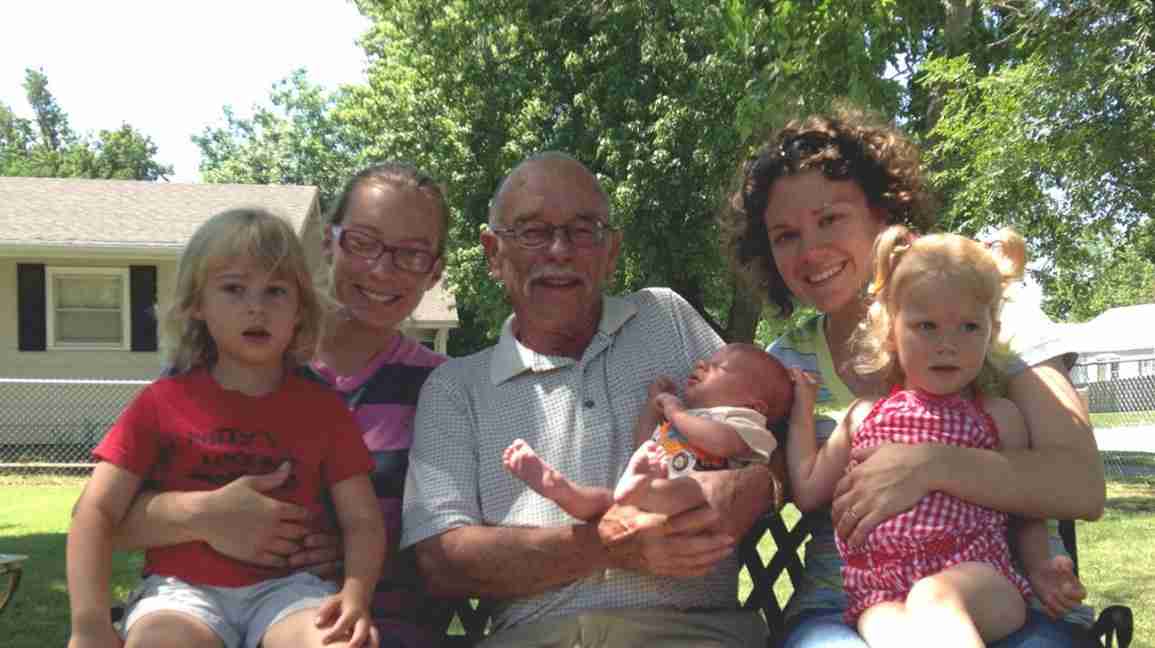
The Other Side of Grief is a series about the life-changing power of loss. These powerful first-person stories explore the many reasons and ways we experience grief and navigate a new normal.
With my daughter running carefree around the yard, I sat with Grandpa and my husband and talked about nothing in particular. Maybe I fawned over the gargantuan English cucumbers he’d planted just for me, or made small talk about the upcoming college football season, or what funny thing his little dog had done recently.
I really don’t remember.
That day was five years ago. While I remember how warm the air was and how good the burgers smelled on the grill, I don’t remember what we talked about during our final afternoon together.
This August was the fifth anniversary of my grandfather’s passing, and two weeks after was the fifth anniversary of my grandmother’s death. After half a decade without them in my life, my grief still feels raw. And then at times, it feels like another lifetime has passed since I lost them.
At the end of that sunny August afternoon, we hugged goodbye and said our I love yous and see you laters. I often feel that I wasted that afternoon. I had three hours with my very much alive grandfather to ask important questions or have a conversation with more substance than cucumbers.
But how could I have known he’d be gone soon after? The reality we all face is that we can’t ever know.
Two days later, “You have stage four cancer that’s metastasized” pounded in my head as I sat in a hospital room with Grandpa and the doctor. I’d never heard those words before. Not in person, not from a doctor, and not directed at anyone I knew so closely.
What neither of us knew, what the doctor didn’t know, was with that diagnosis the egg timer had been flipped. Just a couple days later, Grandpa would be gone.

While I was trying to process this news and feeling clueless about what next steps might be, my beloved grandpa was actively dying. Yet I had no idea.
It was staring me in the face. I was checking him into the hospital, I was hearing the words from the doctor, but none of that processed as “he’s dying right now.”
Surgery was scheduled for the next day. I kissed his salty, bald head, told him I loved him, and said we’d see him soon as they wheeled him to the OR.
I did see him again, but that was the last time he saw me. That next day in the ICU recovery, his body was physically there, but the Grandpa I loved wasn’t present anymore. No one could tell us what was happening, what the prognosis was, or what we should be doing. We left for dinner. Then the nurse called to say the situation had turned critical.
My brother drove us to the hospital, but not nearly fast enough. He dropped me at the door and I ran.
My God I ran so hard and so fast that I nearly pushed someone off a gurney as I rounded a corner for the elevator.
I was met by the chaplain, and I knew he’d passed.
My brother, sister, and I walked behind the curtain to find his tired 75-year-old body, but he was gone. We stood together and thanked him for never missing a Christmas. We thanked him for always being there. We thanked him for being our wonderful Grandpa.
We said all the things you say to someone when they have only a couple days left to live. But it was too late.
And still, then and in the hours leading up to that dreaded moment, I forgot to say goodbye. The words never left my mouth.
Missing my chance to say goodbye — and longing for their last words
The last lesson that old man left me to figure out was death. I’d never been through it before. I was 32 and, up to that point, my family had been intact.
Two weeks later my grandmother, my favorite person on earth, died in the same hospital. I forgot to tell her goodbye, too.
I still get hung up on the fact that I didn’t say goodbye to either of them.
It might seem insignificant, but I think a proper goodbye provides a sense of finality.
I imagine there’s a special kind of closure from both parties acknowledging, and even accepting, that they won’t see one another again. That goodbye is a summation of events, right? At the end of an evening with friends it puts a pin in the last several hours of joy. At someone’s bedside in their final hours, it represents the farewell of a lifetime of moments together.
Now, more than ever, when I depart from loved ones and friends, I make sure to get the hug and I make sure I say goodbye. I don’t think I could bear the weight of missing one more.
The couple times I thought about addressing the elephant in the ICU room, saying the things I needed to say, I’d stop because I didn’t want to upset them. What would it say if I were acknowledging their deaths? Would it look like I was accepting it, fine with it, giving them the “go ahead and go, it’s fine” messages? Because, it was absolutely not fine.
Or would facing that bittersweet conversation head on have given them some kind of peace at the end? Was there any closure or finality they needed that could have made them more comfortable?
I doubt either of them pondered whether I loved them, but in saying that goodbye I could have let them know how deeply they were loved.
Perhaps, it wasn’t my goodbye that was missing. Maybe I needed to hear a final farewell from them, hear that they were OK, that they lived full lives, and were satisfied with the end of the story.
Looking forward after goodbye
It’s a funny creature, grief. In the last five years I’ve learned it rears its head in ways that seem almost laughably sudden and simple. The most ordinary of moments can rip open that longing for people you’ve lost.
Just a few weeks ago I made a quick stop at the grocery store with my daughter. We were walking happily along, trying not to forget the one thing we’d gone in for, when the Phillip Phillips song “Gone, Gone, Gone” came on overhead.
Baby I'm not moving on
I love you long after you're gone
I felt instant tears. Instant hot, streaming tears that soaked my face and took my breath away. I turned down an empty aisle, gripped the cart, and sobbed. My 8-year-old daughter stared at me in the fumbling way I do to her when she falls apart out of nowhere over seemingly nothing at all.
Four years and ten months later I marvel at how that song still breaks me the moment those first notes are struck.
This is exactly what grief looks like. You don’t get over it. You don’t get past it. You just find a way to live with it. You tuck it in a box and make room for it in the nooks and crannies of your emotional spare bedroom, and then sometimes you bump it while reaching for something else and it spills out all over the place and you’re left to clean up the mess one more time.
I was ill-equipped to handle that reality. When my grandparents passed, the bottom fell out of my world in a way I didn’t know possible. It was a year before I could feel the ground beneath my feet.
I’ve spent a lot of time, maybe too much, replaying the hours and days that led up each of their sudden passings. No matter how many times the story has played through my head, I always get stuck at that goodbye and how much I wished it could’ve happened.
Would having said goodbye changed the course of my grief or lessened my pain? Probably not.
Grief fills up all the empty spaces in your heart and head, so it likely would have found something else to wrap its gnarled hands around for me to obsess about.
Since my grandparents have passed, I adopted the mantra: “Get busy living, or get busy dying.” Their deaths forced me to put so much into perspective, and it’s this that I choose to lean into when I miss them most. Their last gift to me was this unspoken, intangible reminder to live as big and loud as I’d ever wanted.
Almost a year after their deaths, my family moved out of our home and put everything in storage so that we could spent six months traveling. We spent that time exploring the entire east coast and redefining how we love, work, play, and live. In the end, we left Wichita and resettled in Denver (I’d have never left when they were alive). We bought a home. We reduced to a single car. I’ve since started two businesses.
I may not have gotten to say goodbye, but their deaths gave me the freedom to say hello to a whole new mindset. And in that way, they're still with me every day.
Want to read more stories from people navigating a new normal as they encounter unexpected, life-changing, and sometimes taboo moments of grief? Check out the full series here.
Brandi Koskie is the founder of Banter Strategy, where she serves as a content strategist and health journalist for dynamic clients. She's got a wanderlust spirit, believes in the power of kindness, and works and plays in the foothills of Denver with her family.
